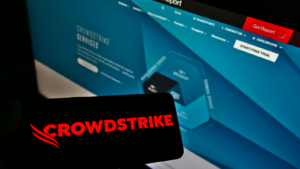Cybersecurity stocks are likely to continue to thrive as AI innovation becomes more important.
Image credit: BeeBright / Shutterstock
Even as many potential attackers harness the power of artificial intelligence, the theme of cybersecurity investment remains prominent:artificial intelligence) are used to compromise systems. Undoubtedly, major cybersecurity companies are also making good use of AI. With powerful technologies available to strengthen attacks and defenses, investors should stick with the top defenders in the market and aim to fully harness the power of AI to protect and defend.
I like to check in iShares Cybersecurity and Technology ETF (NYSEARCA:Ihak) to gauge the cybersecurity market trends. IHAK shares have been climbing steadily recently after experiencing a short-term correction of around 13% earlier this year. While they are still around 8% off their peak, I believe there is potential value in this space. Let's take a look at three of my favorite cybersecurity stocks to buy on this AI-driven theme.
CrowdStrike (CRWD)

Image credit: T. Schneider / Shutterstock.com
Crowdstrike (Nasdaq:CRWD), an $84 billion cybersecurity company, is leading the effort. At the time of writing, CRWD shares are trading just below their all-time highs, at just under $350 per share.
Coming off an impressive first quarter, including subscription revenue growing 42% to $651.2 million from $459.8 billion in the same period last year, Crowdstrike definitely looks like a momentum cybersecurity stock to own, thanks to its momentum and impressive generative AI capabilities that can further enhance the company's already impressive service.
Charlotte AI is a security analyst at the company, and it may offer a glimpse into the future of cybersecurity in the age of generative AI. Amazon (Nasdaq:AmazonCrowdstrike has introduced .NET web services to aid in its generative AI efforts, setting itself apart as an AI-first company that could quickly overtake its peers in the coming years.
Fortinet (FTNT)

Source: Sundry Photography / Shutterstock.com
Fortinet (NASDAQ:FTNT) is a more attractive value option in the fast-growing cybersecurity space for investors who don't like chasing popular stocks near the highs. The company has struggled somewhat, down about 22% from its all-time high in mid-2023.
The company's total bookings last year were $1.41 billion, a slight 6% decrease from the previous year. Certainly, this is due in part to increased competition. Going forward, Fortinet plans to use AI to combat the rise of competitors and AI-enabled attackers.
The company has its own IoT-generated AI assistant called FortiAI that has many features that help neutralize threats. Perhaps the market is underestimating FortiAI's potential after a tough quarter that I don't view as the start of a negative trend. At a forward price-to-earnings (P/E) ratio of 34.4, I view FTNT stock as one of the better bargains in cybersecurity today.
Palo Alto Networks (Pan W)

Source: Sundry Photography / Shutterstock.com
Palo Alto Networks (Nasdaq:Pan W) also looks like an attractive value option after experiencing a massive 30% crash in February 2024. Admittedly, FTNT stock has recovered quite a bit in recent months, but it's still down about 18% from its peak.
Just a few days ago, Fortinet reported third-quarter profits that beat expectations slightly. Adjusted earnings came in at $1.32, slightly above the $1.25 expected. As for projections, Palo Alto expects revenue to be in line with expectations at around $2.15 billion to $2.17 billion.
As with other cybersecurity innovations, Palo Alto is serious about leveraging AI to improve its products to combat “advanced” cyber threats. The company's Precision AI solution aims to “fight AI with AI.” In effect, Precision AI-equipped clients are playing chess while potential attackers are trying to play checkers.
PANW shares still seem a bit pricey at 49.5 times forward earnings, so it may be best to wait for a bigger selloff as the company tries to stay ahead of AI-enabled hackers.
On the date of publication, Joey Frenette did not hold (either directly or indirectly) any positions in the securities mentioned in the article. The opinions expressed in this article are solely those of the author, who owns the copyright of InvestorPlace.com. Publication Guidelines.

